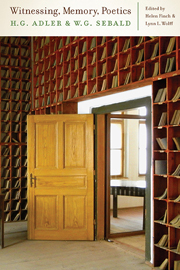Book contents
- Frontmatter
- Contents
- Acknowledgments
- List of Abbreviations
- Introduction: The Adler-Sebald Intertextual Relationship as Paradigm for Intergenerational Literary Testimony
- Part I Intertexts in Context
- Part II Witnessing Trauma and the Poetics of Witnessing
- 4 Bearing Witness: The Poetics of H. G. Adler and W. G. Sebald
- 5 “Schmerzensspuren der Geschichte(n)”: Memory and Intertextuality in H. G. Adler and W. G. Sebald
- 6 “Der Autor zwischen Literatur und Politik”: H. G. Adler's “Engagement” and W. G. Sebald's “Restitution”
- Part III Memory, Memorialization and the Re-Presentation of History
- Part IV Literary Legacies and Networks
- Afterword
- Bibliography
- Notes on the Contributors
- Index
6 - “Der Autor zwischen Literatur und Politik”: H. G. Adler's “Engagement” and W. G. Sebald's “Restitution”
from Part II - Witnessing Trauma and the Poetics of Witnessing
Published online by Cambridge University Press: 05 October 2014
- Frontmatter
- Contents
- Acknowledgments
- List of Abbreviations
- Introduction: The Adler-Sebald Intertextual Relationship as Paradigm for Intergenerational Literary Testimony
- Part I Intertexts in Context
- Part II Witnessing Trauma and the Poetics of Witnessing
- 4 Bearing Witness: The Poetics of H. G. Adler and W. G. Sebald
- 5 “Schmerzensspuren der Geschichte(n)”: Memory and Intertextuality in H. G. Adler and W. G. Sebald
- 6 “Der Autor zwischen Literatur und Politik”: H. G. Adler's “Engagement” and W. G. Sebald's “Restitution”
- Part III Memory, Memorialization and the Re-Presentation of History
- Part IV Literary Legacies and Networks
- Afterword
- Bibliography
- Notes on the Contributors
- Index
Summary
Introduction
In her recent book on The Generation of Postmemory, Marianne Hirsch revisits and expands her concept of “postmemory” to emphasize both its processual nature and the position of the viewer. In considering the transmission of traumatic experiences beyond those experienced during the Holocaust, Hirsch opens up her discussion to allow for transnational as well as intermedial comparisons. In addition to authors, Hirsch looks at visual artists whose works can be situated within “a structure of inter- and transgenerational return of traumatic knowledge.” One of these artists is Bracha Lichtenberg-Ettinger, whose work Hirsch characterizes as follows:
In subjecting her original images to technologies of mechanical reproduction, in degrading, recycling, reproducing, and painting over them, Ettinger underscores the distance and anonymity of the camera gaze. But, at the same time, she allows all of these images to invade, inhabit, and haunt her, and she therefore inscribes them with her own very invested act of looking, exposing, in the images, her own desires, fears, and nightmares.
This description calls to mind both how W. G. Sebald works with images in his literary texts and what effect this method has on his narrators, characters, and, by extension, on us, his readers: by manipulating the surface of images, for example by photocopying photographs to obscure details and increase blurriness, Sebald invests the images with a new imaginative potential. Not only images invade, inhabit, and haunt both Sebald and his works, but texts enter into this process as well, such as the works of H. G. Adler.
- Type
- Chapter
- Information
- Witnessing, Memory, PoeticsH. G. Adler and W. G. Sebald, pp. 137 - 156Publisher: Boydell & BrewerPrint publication year: 2014



